

BSN
Beginnings Foundation Stage (Ages 3 - 5)
Celebration, Diversity and Inclusion
Learning Through Play The Enabling Environment
Starting School/Induction
Breadth of Curriculum and Specialists
Prime Area: Personal, Social and Emotional Development
Prime Area: Physical Development
Area: Communication and Language

Introduction
The time has come for your child to start school and we couldn’t be more excited to welcome them into our community at The British School in the Netherlands (BSN). Our aim is to make the first steps of your child’s school adventure as smooth, positive and happy as possible.
This can be an anxious time for children and their families, as it can be their first experience of spending time without their parents, or it could be a big change from their existing day care experience. Some children will be fluent in English, whilst others may be new to the English language. Our teachers and teaching assistants are excited to meet your child and will ensure they are well looked after and feel safe and secure within the school day. We will meet your child at their individual starting point because we believe that every child is an individual and unique. We are committed to helping every child thrive and meet their potential.
Creating strong relationships with children and their families is key to enabling each child to become the best
that they can be. This begins with an individual meeting before your child starts school and leads into regular opportunities to share your child’s successes in their learning. We believe that the relationship between home and school is fundamental in providing the very best opportunities for young children to flourish and grow in confidence and knowledge.
It is important to us that your child develops a lifelong love of learning and makes rapid progress in their prime areas – you can read more about this in the following pages. Being secure within the prime areas, ensures your child’s readiness to explore new learning in Literacy, Mathematics, Expressive Arts and Design and the Understanding the World elements of the Early Years Foundation Stage statutory framework. (UK Department for Education, updated November 2024).
As you read through this booklet, you will discover more about how your child will be learning in the classroom, and the incredible opportunities and experiences that they will be exposed to in our outdoor spaces and as part of the wider school community. Please come and talk further with us about any questions or queries you may have, or to arrange a tour to see our wonderful learning environment in action during the school day.
Celebration, Diversity and Inclusion
At the BSN, we understand that children arrive with a wide variety of prior educational and life experiences; which can range from full-time or part-time daycare, experiences at other schools and nurseries, as well as leaving their parents for the first time. We value, respect and celebrate the diverse cultural, linguistic and religious backgrounds of all the children.
All adults in school support children in establishing their own sense of identity and recognise the uniqueness of each child. At the BSN, we encourage young children to develop confidence, self-respect, and respect towards their peers.
We acknowledge that young children will developmentally mature at different times and we ensure we accommodate and meet the needs of all children through positive learning experiences, so that all children can achieve their very best. Our Foundation Stage settings are well-placed to provide a safe environment where children, parents and staff can learn about each other’s differences and similarities and empathise and value one another.
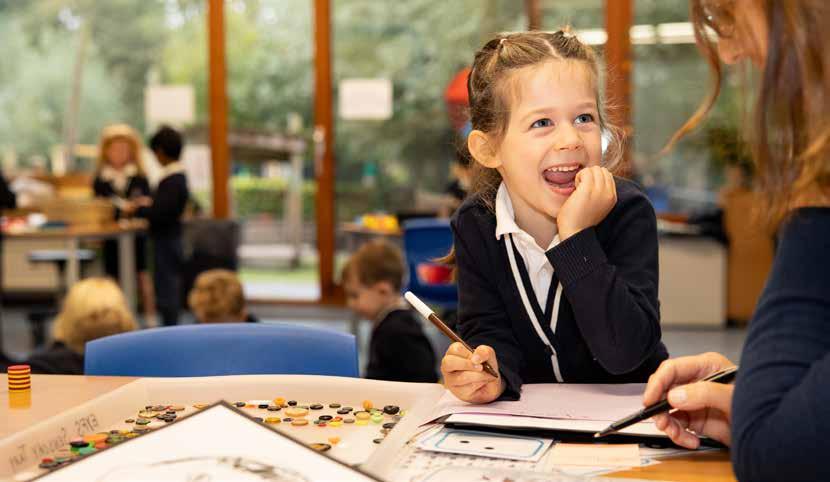

Learning Through Play
Play is at the heart of everything we do in the Foundation Stage. Play helps children understand the world, try out new ideas, and develop important life skills. Our approach to continuous provision allows children time to play and explore their interests, revisit things they’ve learned before, and try new things when they’re ready.
Children play in many different ways. Some enjoy dressing up and acting out stories in the role-play area. Others like building with blocks and other materials, which helps them learn about shapes, space, and numbers. Outside, children climb, run, and play with water and sand. This helps them grow strong and learn how to work with others. Creative play is also very essential. Children paint, draw, make music, dance,
and use clay or playdough. These activities help them express their feelings and develop the small muscles they need for writing.
Adults are active participants in children’s play. They observe closely, listen carefully, and interact thoughtfully —asking open-ended questions, introducing new vocabulary, and offering challenges to extend learning. This approach ensures that play remains purposeful, engaging, and deeply connected to each child’s developmental journey.
Through play, children become confident, capable learners who are curious, resilient, and ready to embrace new challenges.
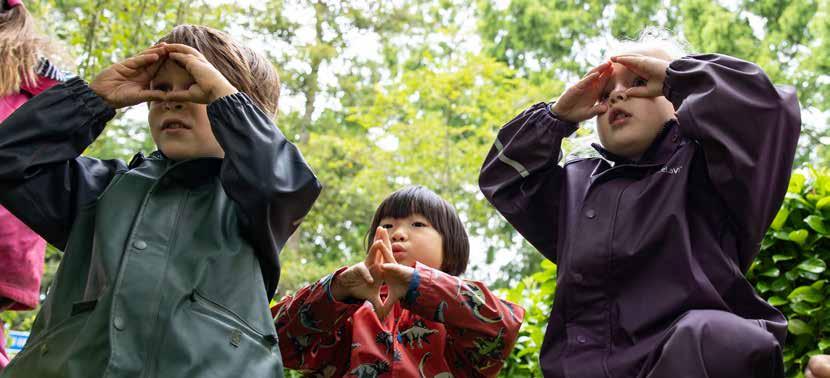
The Enabling Environment
At the BSN, we recognise that young children thrive in environments that are thoughtfully designed to inspire curiosity, independence, and active engagement. Our learning spaces, both indoors and outdoors, are carefully planned to offer a balance of structure and independence, enabling children to explore, create, and discover at their own pace.
We believe that learning is most effective when it is hands-on and rooted in real experiences. Our continuous provision ensures that children have consistent access to a wide range of open-ended resources that reflect their interests and developmental needs. These resources are chosen to encourage exploration, problem-solving, and imaginative thinking across all areas of learning.
Each area of our environment has a clear purpose and invites children to engage deeply. Whether they are investigating natural materials, experimenting with mark-making tools, or collaborating on a group project, children are supported to make choices, revisit ideas, and extend their thinking.
Practitioners play a key role in shaping the environment to meet the developing needs of the children. Through careful observation and reflection, they adapt the provision, introduce new resources, and ensure that every child is challenged and supported. Our enabling environment grows with the children, fostering a sense of ownership, belonging, and joy in learning.
“ When children play in natural spaces, they’re far more likely to invent their own games than in more structured settings – a key factor in becoming self-directed and inventive adults later in life. ’’
Richard Louv, Author, Journalist
Starting School
Our Early Years Foundation Stage (Foundation 1 and 2) is for children aged three to five years old and is the first stage of their education.
Foundation 1 is for children aged three to four years, and they can join Foundation 1 as soon as they are three years old. Children who attended Foundation 1 as an ‘early entry’ student will return to Foundation 1 in September.
Foundation 2 is for children aged four to five, and they need to have turned four by 1 September to join this year group.
Starting school is an exciting time for both you and your child. Our teaching staff are highly experienced in helping children understand and cope with the different emotions they may feel during this process. They do everything they can to help each child settle in as quickly as possible. Adults in school want the children to experience a smooth, happy and confident transition into the BSN. We believe that an effective and well-planned transition enables children to feel safe and secure. We aim to ensure that parents feel supported and informed, and have time to build confidence and trust with our school and staff.
We ensure that your child has a happy experience and thrives in our setting through tailored induction periods for Foundation 1 and 2. Every child is unique and has different needs, so our staff will work with you to ensure the start of school is a successful experience for both you and your child. Working together creates a smooth and happy transition from the home environment into the new class.
Foundation Stage Induction
For Foundation Stage children who are starting school for the first time in September, a personal induction programme is planned. After the induction meeting with the class teacher, the children begin their schooling and build up to full-day attendance within the first week. If a child needs a little longer before attending for whole days, a further plan can be made in consultation with the class teacher. Children who are returning to school in September and have previously attended the BSN may attend school full-time from the start. For children starting Foundation Stage for the first time at other points in the school year, a personal induction programme is arranged on an individual basis.
We expect children coming into F1 to be independent in meeting their own care needs, which include personal hygiene, such as using the toilet and washing/drying their hands. We understand that some children may not be reliably dry due to their developmental needs. As there is only capacity in our Foundation Stage settings to support with occasional accidents, if a child has not yet mastered their own toileting needs, an induction program will be arranged to support toilet training in partnership with the parents.
Breadth of Curriculum and Specialists
To enable each student to thrive, we are committed to exposing them to different opportunities that will enrich their education. In our Foundation Stage, we have a talented team of specialist teachers who create opportunities that match the children’s interests and developmental stages. In addition to our classroom environments, there are also dedicated teaching spaces that the children visit to use specialist equipment. This helps to connect our youngest learners with the wider school community. Visiting additional learning spaces around the school has a noticeable impact on the children’s confidence and how they approach other familiar adults around the school campus. Across the Foundation Stage, children will have access to Forest School sessions, Music lessons, the Dutch language specialists, Library sessions and Physical Education (PE) lessons.

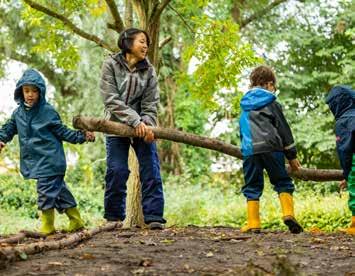
During Music sessions, children have the opportunity to explore instruments and, through practical activities, begin to understand musical concepts such as rhythm, pitch, and tempo. This supports the Expressive Arts and Design strand of the Early Years Framework.
Within PE sessions, children can explore swinging, climbing and balancing equipment that helps to strengthen their core muscles. This supports the Physical Development strand of the Early Years Framework.
On our grounds, we have a dedicated space for children to interact with the natural world, making use of the Forest School area.
Our Foundation Stage staff work with the Dutch Department to create many different opportunities for children to participate in activities and events which expose them to Dutch culture and language. This supports the Understanding the World strand of the Early Years Framework.
Prime Area: Personal, Social and Emotional Development
Personal, Social and Emotional Development is essential for children to lead healthy and happy lives and is fundamental to their cognitive development. It provides children with the best opportunity to achieve and be successful in all areas of their learning.
In the Foundation Stage, we work hard to build strong, warm and supportive relationships which support children to develop a positive sense of themselves and others; form positive relationships with other children and adults; learn how to respect others; develop their social skills such as turn-taking, sharing and independence; manage their own feelings; learn to share and co-operate in both small and larger groups and to develop confidence in their own abilities. Our Foundation Stage environment is carefully planned to support the development of these skills and positive attitudes, which enable children build a strong sense of self-worth. Staff provide a range of opportunities and use different teaching techniques, enabling all children to learn, develop and succeed.
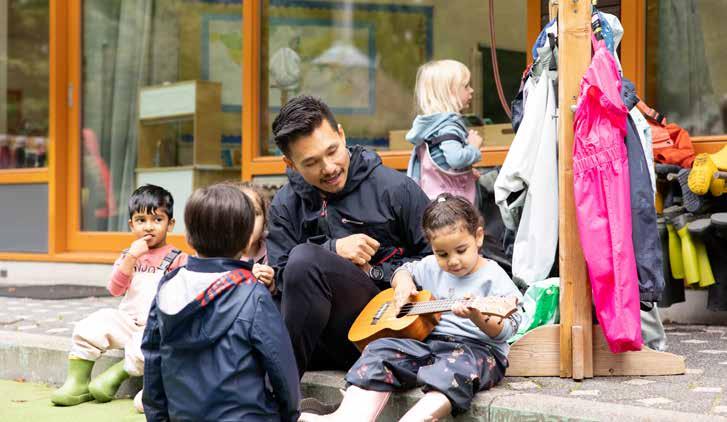
Prime Area: Physical Development
A young child’s physical development is very important. Children learn through their bodies. Every time they move, their brains build connections. Young children need lots of physical activity to develop their balance, posture, and coordination. These are the foundations that will help your child to be physically ready to sit still and concentrate. Physical activity also encourages the development of hand-eye coordination for reading and
writing. Large muscle control develops before fine motor control, so children need lots of opportunities to make big movements with their arms before they can develop the fine motor control needed for holding a pencil. Writing requires a combination of fine motor control and hand-eye coordination; skills which need lots of practice.
In the Foundation Stage, we provide and plan lots of opportunities for the children to use large muscle movements to explore their environment both inside and out, as well as develop fine motor control through manipulating materials and using tools and equipment. The children have regular PE lessons taught by specialist PE teachers to build their physical development further. Children are also taught the importance of lifelong physical activity as part of a person’s all-round wellbeing.
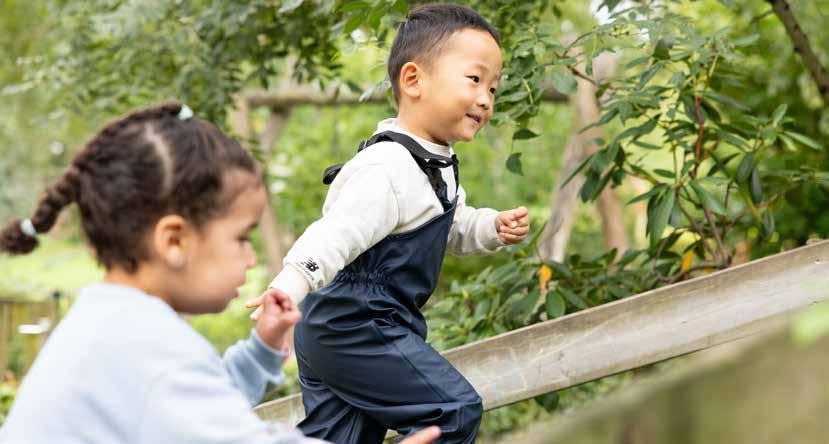
Prime Area: Communication and Language
Listening, attention and understanding
This involves children listening attentively and responding to what they hear with relevant questions, comments and actions when being read to and during whole class discussions and small group interactions. Adults in school encourage them to make comments about what they have heard and ask questions to clarify their understanding. We develop them to hold conversations when engaged in back-and-forth exchanges with their teacher and peers. Children learn to listen and do and build their focus and attention alongside the immediate task they are involved with.
Speaking
There are lots of opportunities to develop speaking skills in school, such as: participating in small group, whole class or one-to-one discussions. They have opportunities to offer their own ideas and use recently introduced vocabulary. We model how to offer explanations for why things might happen and make use of recently introduced vocabulary from stories, non-fiction, rhymes and poems. We ensure opportunities for them to express their ideas and feelings about their experiences using full sentences, including use of past, present and future tenses and making use of conjunctions, with modelling and support from their teacher. There are also
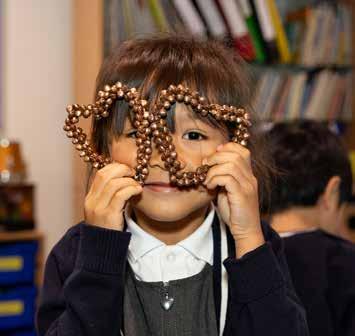
opportunities to extend their speaking when in the role play areas in class, when using small objects of the world to create imaginative stories and using technology to enhance opportunities too.
How we encourage your child’s language and communication development
To support a child’s language and communication development, we provide lots of opportunities to have conversations with adults, modelling correct language and introducing new vocabulary. Children learn language better when they’re engaged with things that fascinate, challenge, and excite them. Young children need to hear and say new words often to strengthen the connections in their brains and to keep building their vocabulary. One of the ways we do this is through making links between words by using rhyming, as this helps children to break words down and to hear the sounds that make up words.
Specific Areas: Literacy, Mathematics, Understanding the World and Expressive Arts and Design
Literacy
In the Foundation Stage, we begin to focus on emergent literacy and the knowledge and skills that children must acquire before more formal literacy learning begins. Our youngest learners are immersed in a language-rich environment with many opportunities for talking and engaging in literacy practices that are developmentally appropriate, purposeful, and meaningful.
At this stage of development, activities such as talking, singing, shared reading, oral storytelling, drawing and writing help to promote strong literacy skills whilst also having lots of fun, ensuring that children develop a life-long love of reading, writing and shared storytelling. A wide range of books in our class and whole-school libraries, including non-fiction texts, storybooks, poetry, and rhymes, provide opportunities to make the shared reading experience enjoyable and exciting. Children begin to develop an awareness of language structures such as rhyme, alliteration, and syllables, which in turn, help them to begin to identify individual letter sounds and begin to match them to written letters.
As the children progress through the Foundation Stage, they begin to use their knowledge of letters and sounds to enhance their play. The most engaging way to entice young learners is to ensure that their writing has a purpose, such as creating invitations to a party, labelling parts of their construction or models, birthday cards for family members or writing simple stories from their play in class. Each child is exposed to regular teaching of oracy and phonics, which help them to become confident communicators, readers and writers.
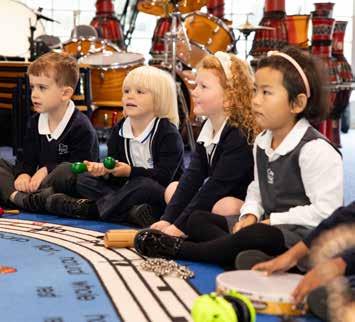
Mathematics
At the BSN, we want to inspire a love of Mathematics in our youngest learners. We want to encourage the children’s naturally enquiring minds and support their problem-solving and reasoning skills. Mathematical development grows through play and exploration, both indoors and outdoors. Our children have many opportunities to explore, investigate, talk, and problem solve in practical, concrete experiences, which build on prior experiences and make connections to the world around them. Skills are developed in counting, understanding and using numbers, calculating simple addition and subtraction problems, as well as describing shapes, space and measure.
Teaching staff plan and support opportunities for children to test and apply their mathematical knowledge and understanding in all areas of the classroom. The use of concrete manipulatives such as counters, dice, board games, pattern blocks, Numicon, geoboards, Unifix cubes, Cuisenaire Rods and virtual manipulatives creates a mathematically-rich environment in which children are able to touch, feel and manipulate the maths and develop their understanding and vocabulary from which maths mastery begins.
Expressive Arts and Design
Exploring and playing with a range of media and materials is a wonderful way for young children to discover their artistic skills in imaginative ways. This area of the curriculum provides the children with opportunities to share their own ideas, thoughts, and feelings through a wide range of exciting activities in art, music, movement, dance, role play, construction and design and technology.
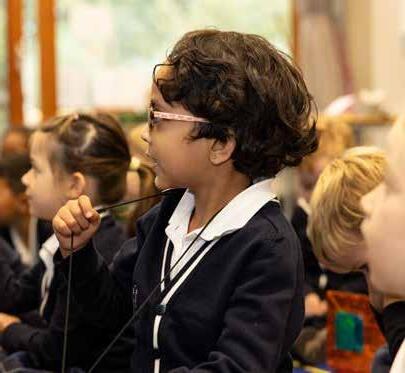
Understanding the World
Helping children make sense of their physical world and community through opportunities to explore, observe, and learn about people, places, technology, and the environment is a key aspect of learning for young children. In their immediate environment, children will look at similarities, differences, patterns and changes related to nature, people, the community, and technology. The staff will learn what interests your child and plan for this in the classroom provision, which helps to elicit natural curiosity, interest, imagination, awe and wonder.
School Readiness
As your child begins their education with us, there are many ways that both home and school can help your child be ready for the Foundation Stage.
Independence
At home, you can support your child by helping them be independent; putting their shoes on and off, getting dressed, going to the toilet and self-care routines when using the toilet, such as washing their hands. You can support your child by helping them recognise their belongings, such as their coat and school bag, as well as their snack box and lunch box. Children can be independent with their belongings when they know what items belong to them. In our Foundation Stage, we acknowledge that all children have different starting points and if your child needs assistance, adults in school will help them and support and guide them to become independent.
Reading
Reading aloud to your child is a powerful way of connecting and bonding with your child. Using a range of voices, pitch and volume can bring characters in a book alive and spark their interests. In school, we value reading aloud every day. The adults share texts with the children, make up stories and invite the children to join in and act out the characters in stories.

Communication
Asking your child questions about what they are doing and demonstrating how you expect them to answer can be very supportive to help them communicate effectively with children and adults. Praising your child for making eye contact, looking, and listening when an adult or family member is talking, helps to develop their communication skills and understanding of what is being communicated. Adults in school use a range of opportunities throughout the day, such as modelling polite conversation at eating times, demonstrating how to share ideas during our whole class inputs on the carpet and explicitly showing what great listening looks like so the children know the expectations of active listening.
Partnership with School
Parent-teacher partnerships are fundamental in supporting children and building a solid foundation for learning. Effective partnerships work best through trust, transparency and responsibility from all parties involved. It is important that children can observe a good relationship between their parents and teachers as it impacts the way they build relationships with others. Parental involvement in the Foundation Stage helps parents to understand what’s going on behind their children’s activities and empowers them to support their children at home. We work together by supporting learning and development and sharing information.
Here are some of the ways we develop this partnership in the Foundation Stage:
● Initial meetings - When children first enrol at the BSN, we have meetings with parents and the child to help them become familiar with the school and staff. This is also an opportunity for parents to share any information about their child.
● Daily contact with teaching staff - At the beginning and end of the day, the teaching staff will welcome and say goodbye to your children. This is a time to pass on any brief messages about the children. If something needs to be discussed in greater detail, then an appointment can be made with your child’s class teacher outside of the school day.
● Tapestry, our online learning journal - Every child in Foundation Stage has a Tapestry account. Every week the teaching staff will share a photo or video of the children in the learning environment, giving parents a
window into their child’s life at school. Parents can also upload photos and videos from home for their child to share with the class.
● Classlist - Parents can use Classlist to connect securely with other BSN parents and learn about Family Association activities. Your Class Parent Rep will sometimes use Classlist to share school reminders.
● BSN Compass - Compass is our internal platform for parents and guardians. You can access your Notes Home on Compass and find useful information about many school topics. Newsletters are published regularly on the Campus Hubs to share important updates, learning plans, and more.
● Parental involvement - There are many opportunities throughout the year to visit school and help in class. For example, class parent representatives, parent readers and helping with school trips and events.
● Learning Review - Parents will receive regular learning reviews detailing their child’s development.
● Parents Teacher Consultations - During the school year, we have formal parent teacher consultations to discuss each child’s development and learning journey. An opportunity for parents and staff to share and give feedback.
● Workshops - During the year there will be a selection of parent workshops focusing on different areas of learning and development.
● Coffee mornings and events - Weekly coffee mornings with the Family Association (FA) offer opportunities to connect with other parents in our school community. Parents can also get involved with events; talk to your FA campus rep for more info.
● Social media - Please follow the school on social media (Facebook and Instagram).

